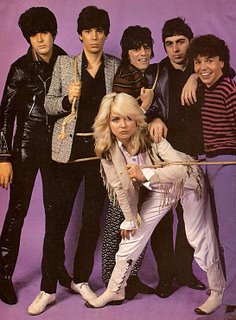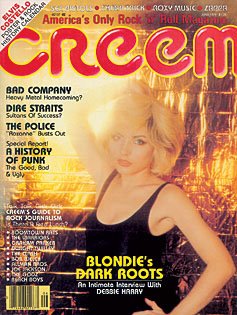
Much like calculus, yard work or NASCAR, the Rock & Roll Hall of Fame is unimportant to me, so I only just now got around to watching Blondie being inducted into it. Blondie being “honored” in such way was a big yawn… until I was genuinely moved by parts of Shirley Manson’s introduction speech:
“Blondie will enter the hall of fame as one of the coolest, most glamorous, most stylish bands in the history of rock & roll… There is just coolness and sweetness and integrity and grace.
“Debbie Harry, the most beautiful girl in any room in any city on any planet… She carefully subverted her mind-blowing beauty with her punk spirit and her gladiator heart.”
Chris Stein put it best when he responded with, “That really put dents in my cynicism.” Agreed. It also caused a flood of old feelings to break my dam.
For every serious music fan, there is that one song, that one moment, or that one album that completely changes their life. It’s such a dramatic, cinematic moment that classifying ones life as B.C. or A.D. is the only way to convey the religious weight of it. My Jesus of Cool rose from the dead the moment I heard Debbie Harry sing, “Yeah, riding high on love’s true blueish light/Ew ew oh oh.”
I heard “Heart Of Glass the very first week it hit the Top 40 Billboard chart, and my antennae started quivering. I knew the song was trying to be disco, but there was a lot more going on under the covers. I suddenly recalled all the little tid-bits about Blondie that I’d run across in my teen girl magazines (like a picture of Debbie with Brooke Shields), and I could literally feel pieces falling into place.
I bought the single, and actually liked the flip side much better. “11:59” was urgent and pleading while the singer’s voice was cool and detached, and the dichotomy sucked me in. Plus, the label read:
"Produced by Mike Chapman.”
Oh, man, count me in!
I then rushed out to buy Parallel Lines, and there was no going back. Despite the prejudice of my religious conversion, that cover is still one of the most striking examples of album artwork: simple yet effective, conveying layers of meaning and style with just a few broad strokes.
That album sounded like a jukebox full of promise. Sounds that I’d loved in various forms before were now brought together under one umbrella. I heard “Sunday Girl,” and “Pretty Baby” and found them just as yummy and hook-filled as any of my childhood AM pop favorites, and they did a cover of a Buddy Holly tune! But I also heard hard, chaotic, frantic sounds that riled me up, like “One Way Or Another,” “Hanging On the Telephone” and “Will Anything Happen?” I asked myself, “Is this punk rock?”
“Heart Of Glass” was the lamest thing on the album, and I was ecstatic!
With a gift of hyper information absorption, I went through a crash course on Blondie. I discovered new magazines like Circus and Hit Parader, and it was blast to find Blondie popping up in staples such as People, US and Dynamite. In short order, I was a Blondie encyclopedia, and when “Heart Of Glass” hit #1 two months later, I was both shocked and pleased.
Blondie was a new world, where not all songs were love songs, where there was subtext and layers of meaning behind every lyric, every riff, and every artistic decision. Blondie was the tree trunk that sent me climbing onto a thousand branches. They “schooled” me on punk, Andy Warhol, CBGB’s, underground art and films, early 60s girl group pop, and that there was a lively, exotic world thriving outside the Billboard Top 40. Blondie taught me more about the broader cultural world within a couple months’ time than I had learned in my previous 13.5 years. It was heady and addictive.

“Blondie is a Group,” and then there was Debbie Harry. She was (and is) a goddess! Aside from Cher, I’d never experienced anyone like her. She was absolutely gorgeous, cooler than shit and had the most glamorous clothes, shoes and hair imaginable. In print, she was intelligent and insightful, but very coy about her past (back then, she had age issues), which gave her an air of mystery. She and boyfriend Chris Stein created and ran the band, and she was an equal partner in songwriting, presentation and direction. She was so beautiful and powerful and talented that she seemed more like a comic book hero than a real-life woman, but it was all true. Everything I needed to know about life, sex, fashion and music was learned at Miss Harry’s feet, and because American media became as infatuated with her as I was, it was easy to get all the advice I needed.
Blondie profoundly altered my view of the world, and I had the utopian belief that it affected everyone else, as well. But I quickly learned that at Kirby Junior High in St. Louis County, there was no change at all. Blondie was a bad topic with my peer group who labeled them disco, or punk, or queer or strange. I knew they were dead wrong, and the Us vs. Them mind set took firm root in my psyche. I’d unwittingly found another way to further ostracize myself from my peers, but this time it left me with something better. Blondie gave me football fields of things to think about, which made staying quiet and ignoring everyone so much easier to do.

Blondie was always ahead of the curve on so many fronts, and because of this gift (or curse), they sometimes confused me, but they always wound up accurately predicting future pop trends (for better of for worse). After Blondie melted down, Debbie Harry continued to improve as an artist. In her 50s, she took on the exacting task of becoming a jazz singer, and her time with the Jazz Passengers turned what was previously a distinctive and effective voice into a true musical instrument that has vastly enriched the sound of the present-era Blondie. Most singers’ voices erode with time; hers improved. That is just one example of the alien miracle that is Deborah.
And it can’t be stated enough: She’s just naturally cool, “with her punk spirit and her gladiator heart.” Even when an ex-band mate tried to put her on the spot at the induction ceremony (read Chris Stein’s tale of the event), she breezed right past it with a crack and a kiss on the lips. To be so continuously and effortlessly cool for so many decades is, basically, impossible. That may sound so junior high of me, but so what? If someone thinks “cool” isn’t important, than they never truly got rock at all…and they probably think the Rock & Roll Hall of Fame is important. It’s not, but Blondie is.
